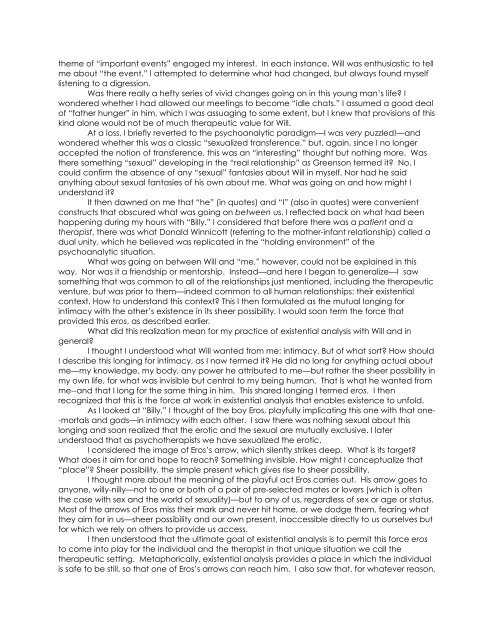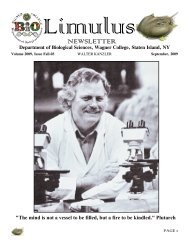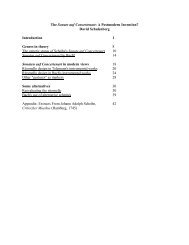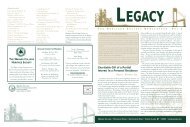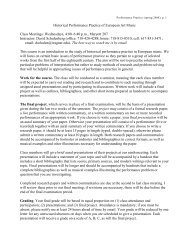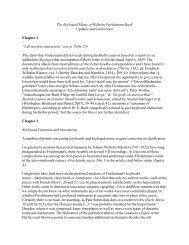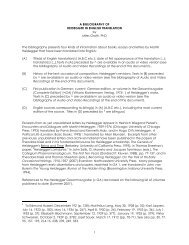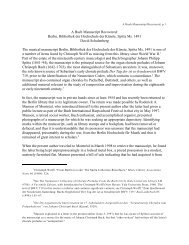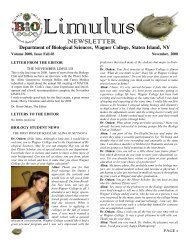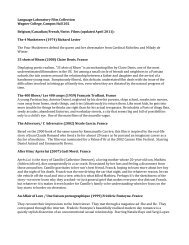SEVEN PAPERS ON EXISTENTIAL ANALYSIS ... - Wagner College
SEVEN PAPERS ON EXISTENTIAL ANALYSIS ... - Wagner College
SEVEN PAPERS ON EXISTENTIAL ANALYSIS ... - Wagner College
You also want an ePaper? Increase the reach of your titles
YUMPU automatically turns print PDFs into web optimized ePapers that Google loves.
theme of “important events” engaged my interest. In each instance, Will was enthusiastic to tell<br />
me about “the event.” I attempted to determine what had changed, but always found myself<br />
listening to a digression.<br />
Was there really a hefty series of vivid changes going on in this young man’s life? I<br />
wondered whether I had allowed our meetings to become “idle chats.” I assumed a good deal<br />
of “father hunger” in him, which I was assuaging to some extent, but I knew that provisions of this<br />
kind alone would not be of much therapeutic value for Will.<br />
At a loss, I briefly reverted to the psychoanalytic paradigm—I was very puzzled!—and<br />
wondered whether this was a classic “sexualized transference,” but, again, since I no longer<br />
accepted the notion of transference, this was an “interesting” thought but nothing more. Was<br />
there something “sexual” developing in the “real relationship” as Greenson termed it? No. I<br />
could confirm the absence of any “sexual” fantasies about Will in myself. Nor had he said<br />
anything about sexual fantasies of his own about me. What was going on and how might I<br />
understand it?<br />
It then dawned on me that “he” (in quotes) and “I” (also in quotes) were convenient<br />
constructs that obscured what was going on between us. I reflected back on what had been<br />
happening during my hours with “Billy.” I considered that before there was a patient and a<br />
therapist, there was what Donald Winnicott (referring to the mother-infant relationship) called a<br />
dual unity, which he believed was replicated in the “holding environment” of the<br />
psychoanalytic situation.<br />
What was going on between Will and “me,” however, could not be explained in this<br />
way. Nor was it a friendship or mentorship. Instead—and here I began to generalize—I saw<br />
something that was common to all of the relationships just mentioned, including the therapeutic<br />
venture, but was prior to them—indeed common to all human relationships: their existential<br />
context. How to understand this context? This I then formulated as the mutual longing for<br />
intimacy with the other’s existence in its sheer possibility. I would soon term the force that<br />
provided this eros, as described earlier.<br />
What did this realization mean for my practice of existential analysis with Will and in<br />
general?<br />
I thought I understood what Will wanted from me: intimacy. But of what sort? How should<br />
I describe this longing for intimacy, as I now termed it? He did no long for anything actual about<br />
me—my knowledge, my body, any power he attributed to me—but rather the sheer possibility in<br />
my own life, for what was invisible but central to my being human. That is what he wanted from<br />
me--and that I long for the same thing in him. This shared longing I termed eros. I then<br />
recognized that this is the force at work in existential analysis that enables existence to unfold.<br />
As I looked at “Billy,” I thought of the boy Eros, playfully implicating this one with that one-<br />
-mortals and gods—in intimacy with each other. I saw there was nothing sexual about this<br />
longing and soon realized that the erotic and the sexual are mutually exclusive. I later<br />
understood that as psychotherapists we have sexualized the erotic.<br />
I considered the image of Eros’s arrow, which silently strikes deep. What is its target?<br />
What does it aim for and hope to reach? Something invisible. How might I conceptualize that<br />
“place”? Sheer possibility, the simple present which gives rise to sheer possibility.<br />
I thought more about the meaning of the playful act Eros carries out. His arrow goes to<br />
anyone, willy-nilly—not to one or both of a pair of pre-selected mates or lovers (which is often<br />
the case with sex and the world of sexuality)—but to any of us, regardless of sex or age or status.<br />
Most of the arrows of Eros miss their mark and never hit home, or we dodge them, fearing what<br />
they aim for in us—sheer possibility and our own present, inaccessible directly to us ourselves but<br />
for which we rely on others to provide us access.<br />
I then understood that the ultimate goal of existential analysis is to permit this force eros<br />
to come into play for the individual and the therapist in that unique situation we call the<br />
therapeutic setting. Metaphorically, existential analysis provides a place in which the individual<br />
is safe to be still, so that one of Eros’s arrows can reach him. I also saw that, for whatever reason,


